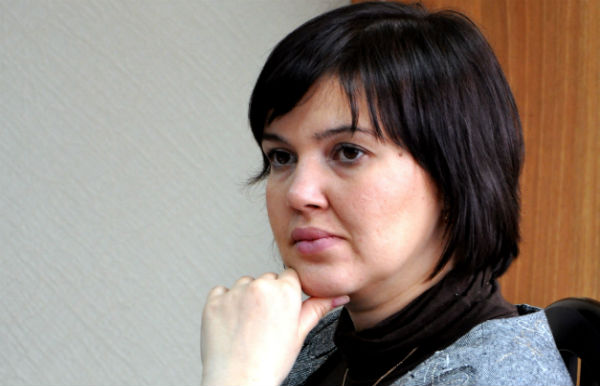Yanina Melnikava is a member of the Belarusian Association of Journalists, which aimed at ensuring freedom of speech and right to information, as well as promoting professional standards of journalism. In her view, Belarus has adopted a policy that aims to reduce the number of independent media outlets in the country as much as possible — and this, at the legislative level.
What’s the state of Belarusian media today and what problems do news outlets have?
Though our population is 2.5 times greater than Armenia’s, we have only 4 TV channels — and all state-controlled. We have neither a private nor public TV company.
There’s only one independent TV channel, Belsat, which is an EU project and is physically located in Warsaw. The problem, however, is that this TV company cannot register its representatives in the country; consequently, no journalist working in this news agency can be considered a legal employee and is violating the law. According to Belarusian legislation, considered a journalist is she who has established a contractual relationship with an editorial office; that is, we don’t have free [freelance] correspondents. Journalists who work for foreign media agencies aren’t considered journalists — they are considered citizens who violate the law and, as defined by the court, illegally call themselves journalists.
The majority of radio stations are privately owned, but they don’t decide their journalistic policy. They mainly have blogs with very brief news, which, as a rule, don’t cover public, political processes that are happening in the country and are limited to very superficial, entertaining news.
We have 4 independent papers, which still continue to exist. Also, 1 major nationwide and 15 small regional papers, but these combined have fewer print runs than the Friday edition of Soviet Belarusia, which might reach a print run of 500,000 copies. All state institutions and their employees (teachers, doctors and so on) are obliged to subscribe to this paper and show their subscription receipts to the Ideological Division. A large portion of bureaucratic newspapers work on this same principle — that is, people are simply forced to read them. And, such newspapers are distributed free of charge during an election period.
|
“Journalists who work for foreign media agencies aren’t considered journalists — they are considered citizens who violate the law and, as defined by the court, illegally call themselves journalists”
|
Unlike for state news agencies, it’s more expensive for non-state news agencies to be published. Their publications can’t be sold in kiosks or be included in subscription catalogues, and there’s no alternative way to being distributed here. And so these newspapers are forced to be distributed like so: those that have a license for retail trade are sold on the street by elderly women, while those that aren’t licensed are placed in envelopes (having the appearance of a letter) and sent to those who call and order them.
It’s been at least 5 years that a new newspaper hasn’t launched in Belarus. The reason first of all is that the state tries in every way not to allow it. According to a recent law on mass media, a person who hasn’t worked in a managerial position at a news outlet for at least 5 years cannot become the editor of a newspaper. It goes without saying that it’s quite difficult to find such people, and those who do have this experience are not accepted by the Ministry of Information.
Various international organizations declare that freedom of speech is strictly restricted in Belarus. According to Reporters Without Borders, in 2011, as compared to the previous year, Belarus moved down from 154th place to 168th [in the Press Freedom Index]. What is the reason for such a sharp decline?
|
“The state authorities wanted that the image of atrocities committed against people who’d come out on the street not be published by news media and not be shown from different platforms in Europe. This is why they persecuted journalists, so that they could restrict the distribution of their material”
|
The main reason was the state authorities reaction following the Dec. 19, 2010 elections. Journalists found themselves in the same group as opposition politicians and became hostage to this reaction. On the 19th, our association was conducting monitoring: in only one day, about 27 journalists were arrested, 25 were beaten.
In the following days, nearly every day KGB employees would go to journalists’ homes, conduct searches, lock down their property, seize the technology and equipment that, in their opinion, “was important for investigations”. The state authorities wanted that the image of atrocities committed against people who’d come out on the street not be published by news media and not be shown from different platforms in Europe. This is why they persecuted journalists, so that they could restrict the distribution of their material.
But this, of course, this was foolishness on behalf of the authorities because even if equipment is seized from journalists, people who have phones were filming and disseminating through the Internet — even from the vehicles intended to transport prisoners, when they were arrested.
International agencies have described Belarus as an “Internet Enemy” country. What’s the state of internet freedom in the country?
In Belarus, the Internet is widespread: at last count, four million people (that is, about half the population) have access to the Internet. That time when the authorities began to quite strongly suppress news outlets, when newspapers by the dozens were forced to shut down, and journalists wanted to continue working in independent media outlets, the newspapers migrated to the Internet. The authorities understood that they also have to seize the Internet. And they began to block independent sites, especially during important happenings, such as, for example, the elections.
For the elections, the authorities prepared their versions, mirror sites, of websites that have thousands of readers. It seemed as if the reader was visiting the site he wanted to visit, but the information that he was looking for wasn’t there.
The authorities were also blocking https sites — Gmail, Facebook. Only Twitter was working, through which people were disseminating information.
And how is social media used?
Social networks especially were used effectively this past summer during the so-called “silent protests”. After the subway explosion, youth in social networks decided to organize a rally: every Wednesday evening to come to the central square in their cities, without posters or chanting slogans — to simply walk and clap. The main idea of the rally was for people to overcome their fears. At the first rally, only a few people participated. Later, their number grew to thousands.
|
“If necessary, this interview, other interviews, and speeches made from far-reaching platforms will become part of a criminal offense and will be used against me”
|
Then the police’s special forces unit appeared and began to arrest people, to disperse the rallies and shut down the city’s central streets. The state machine began to get more active.
Initially, demonstrators weren’t taken to trial; some time after being arrested, they were released. They they began to take them to court and appoint fines, which were paid for by fellow demonstrators who collected the money to release those arrested.
Bloggers too were expressing their views on blogs, but when their posts were “caught,” they would become cause to launch criminal proceedings.
I’m speaking with you now but according to Belarusian law, I am discrediting my country, which is a criminally punishable act. It’s true, no one has been taken to court for this yet, but this is inscribed in the law. And if necessary, this interview, other interviews, and speeches made from far-reaching platforms will become part of a criminal offense and will be used against me.
How many imprisoned journalists are there?
As of today, 4 members of the association having 1,100 members are imprisoned up to 5 years. One of these, for example, is accused of an attempt to blow up the KGB building with a group of anarchists. The rest are those who apart from working in journalism, also expressed their political position and backed opposition politicians. And, of course, also imprisoned is our organization’s most famous member, Ales Belyatsky, who is accused of tax evasion; however, even after various individuals and organizations collected the requested amount and transferred it to the state’s account, he wasn’t released.
After the last general election, many journalists were forced to leave the country because to fight or to prove something in court is practically impossible. The court is a farce; people work there according to a previously scripted scenario.
Are there taboo topics for media and what threats do news outlets face if they cover these topics?
There are no taboo subject for independent journalists, but there is voluntary self-censorship. We know why we stop or avoid coverage of Lukashenko, his personal life, his family and their wealth. It’s very scary and dangerous to write about corruption. We have the example of murdered journalist Veronika Cherkasova: she was found at her home with more than 20 stab wounds. According to the journalistic investigation, the reason could be Cherkasova’s investigation into the case of Belarus’ arms sales to the Middle East. This, of course, is a signal to other journalists, not to engage in such things.
Interview conducted by Anna Barseghyan







